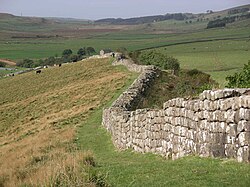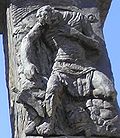This article needs additional citations for verification .(July 2019) |


| Millennia |
|---|
| 1st millennium |
| Centuries |
| Timelines |
| State leaders |
| Decades |
| Categories: |
| Births – Deaths Establishments – Disestablishments |
The 2nd century is the period from AD 101 (represented by the Roman numerals CI) through AD 200 (CC) in accordance with the Julian calendar. It is considered part of the Classical era, epoch, or historical period.
Contents
Early in the century, the Roman Empire attained its greatest expansion under the emperor Trajan, but after his death became primarily defensive for the rest of its history. Much prosperity took place throughout the empire at this time, ruled as it was by the "Five Good Emperors", a succession of well-received and able rulers. This period also saw the removal of the Jews from Jerusalem during the reign of Hadrian after Bar Kokhba's revolt.
The last quarter of the century saw the end of the period of peace and prosperity known as the Pax Romana at the death of the emperor Marcus Aurelius, last of the "Five Good Emperors", and the ascension of Commodus. After Commodus was murdered in 192, a turbulent period known as the Year of the Five Emperors ensued. After the quick successive removals of Pertinax and Didius Julianus from power, this period had the general-turned-emperor Septimius Severus, who was the founder of the Severan dynasty, pitted against rival claimants in the form of Pescennius Niger. Severus' forces defeated the rival claimants at the Battle of Issus in 194, and Clodius Albinus, whom he defeated at the Battle of Lugdunum in 197, granting Severus sole authority over the empire. [1]
Although the Han dynasty of China was firmly cemented into power and extended its imperial influence into Central Asia during the first half of the century, by the second half there was widespread corruption and open rebellion. This led to its decline, and in September 189, the Han general Dong Zhuo, after being summoned to the capital by He Jin to help quell the corrupt and powerful eunuch faction by serving as an intimidator to both them and the Empress Dowager, marched his army into Luoyang in light of He Jin's assassination and the subsequent slaughter of the eunuchs, taking over the capital and effectively becoming the de facto head of the government.
Warlords and government officials quickly took against him in a campaign that, while failing to put him down, compelled Dong Zhuo to shift the seat of imperial power further west to Chang'an. As Dong Zhuo was killed in 192, the chaos in the wake of the collapse of centralized authority only continued, with various warlords attempting to vie for supremacy in order to establish or hold onto their authority within the decaying empire. Meanwhile, Dong Zhuo's former followers Li Jue and Guo Si were left to squabble amongst themselves, while Emperor Xian himself fled and returned to the ravaged city of Luoyang. In 196, he was given refuge by the warlord Cao Cao, who relocated him to the new capital city of Xu, from where he could control the emperor. Cao Cao would further exert his authority by defeating the powerful warlord Yuan Shao at the decisive Battle of Guandu in 200.










